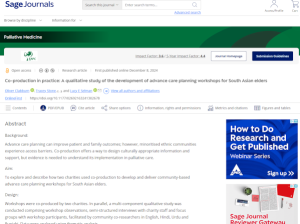Co-production enhances advance care planning for South Asian elders
17 December 2024
A recent study has highlighted the value of co-production in designing and delivering culturally sensitive advance care planning (ACP) workshops for South Asian elders. The study, published in Palliative Medicine and involving NIHR ARC West researchers, focuses on workshops conducted by two charities in a London borough with a high proportion of South Asian residents. It offers new insights into overcoming barriers to end-of-life planning in minoritised communities.
Advance care planning allows individuals to express their preferences for end-of-life care, but uptake remains low, particularly among ethnic minority groups. Inadequate communication, language barriers and cultural taboos around death often prevent these communities from engaging with formal ACP services.
To address this, the two charities — a national organisation specialising in advance care planning and a local community charity supporting vulnerable South Asian elders — collaborated to co-produce workshops that were both culturally appropriate and community-led.
The study, which took place over eight months, centred on four community-based workshops designed to educate South Asian elders about advance care planning and start conversations about their wishes for their future care. Participants were given tailored information in multiple languages (Urdu, Hindi, Punjabi, and Gujarati), facilitated by staff members with extensive experience in community outreach.
The workshops were developed using a co-production model. This ensured both the charities and community members worked together to design the workshops, including content and format.
The success of the workshops could largely be attributed to their culturally sensitive approach. For example, the workshops included discussions around common cultural perceptions of death and dying, addressing both the emotional and practical aspects of advance care planning. Many South Asian elders reported they found the conventional, medicalised approach to ACP inaccessible. Instead, the informal, conversational style adopted by the workshops, alongside the use of familiar community spaces, allowed for a more comfortable engagement with the topic.
A key finding from the study was that, when community leaders and healthcare professionals engage in co-design with local communities, it enhances both the relevance and accessibility of the material.
This study contributes valuable evidence to the growing body of research on co-production in palliative care. By demonstrating how community-led, culturally tailored interventions can increase engagement with advance care planning, it provides a framework for other healthcare providers seeking to improve access to ACP among minority ethnic groups.
The study underscores the importance of collaboration between local community organisations and national health charities. Such partnerships can bridge the gap between formal healthcare systems and the communities they serve, ultimately leading to more inclusive and equitable healthcare delivery.
Professor Lucy Selman, one of the study authors and Professor of Palliative and End of Life Care at the University of Bristol, said:
“Co-production is not just about changing how we provide information but about creating an environment where individuals feel they can have their voices heard and respected.
“Our study highlights that co-production – when grounded in trust, cultural sensitivity, and active community participation – offers a promising method to improve access to and engagement with advance care planning for South Asian elders. The model we evaluated provides a scalable, adaptable approach that could be applied to other communities facing similar barriers to healthcare access.
“We think this study provides important insights for healthcare providers, policymakers, and community organisations looking to make healthcare more inclusive and culturally appropriate.”
Paper
